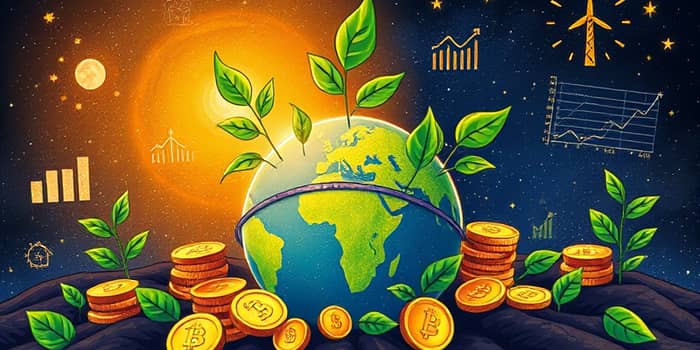In a world grappling with climate change and ecological degradation, the choices we make with our money carry immense weight. What if every dollar you invest or spend could become a catalyst for environmental healing? This article will guide you through the dynamic realm of sustainable investing and conscious consumption, offering practical steps to align your finances with the health of our planet.
What is sustainable investing and why is it growing?
Sustainable investing, often called ESG (Environmental, Social, Governance) investing, integrates ethical considerations alongside financial metrics. Rather than focusing solely on profit, these strategies evaluate corporate impacts on the environment, communities, and governance practices.
Over the last decade, investor demand has skyrocketed globally. Today, 88% of investors are interested in sustainable strategies, with Gen Z and Millennials leading the charge at 99% and 97% respectively. This surge reflects a fundamental shift: people want to see their money drive positive real-world environmental outcomes.
Understanding ESG criteria
ESG criteria serve as a framework for evaluating investments based on:
- Environmental factors: carbon emissions, resource management, renewable energy adoption.
- Social considerations: labor practices, community engagement, diversity and inclusion.
- Governance standards: board diversity, executive compensation, transparency policies.
By applying these metrics, investors can screen out high-impact offenders like deforestation drivers, while favoring companies committed to supply chain transparency and ethical sourcing. More than 90% of S&P 500 companies now publish ESG reports, reflecting a surge in corporate accountability.
Performance: sustainable vs conventional funds
One of the most compelling arguments for sustainable investing is its financial performance. Contrary to outdated assumptions, ESG funds have delivered competitive returns, and in many cases, outperformed traditional funds.
Consider a simple comparison of a $100 investment held from December 2018 through early 2025:
These figures underscore that you do not have to sacrifice returns for ethics. In fact, many investors now believe that sustainable portfolios may offer long-term financial performance advantages, bolstered by lower risk and enhanced reputational benefits.
Consumer power and individual action
Investing is only part of the equation. Everyday spending habits also wield transformative power. By directing your purchases toward eco-friendly products and zero-waste services, you send a clear market signal that sustainability matters.
- Choose brands with certified sustainable sourcing, such as RSPO-certified palm oil.
- Support local businesses embracing circular economy models.
- Opt for renewable energy providers or community solar programs.
- Reduce single-use plastics by switching to reusable alternatives.
Every decision, from the groceries you buy to the bank where you save, contributes to a larger cultural shift toward responsible consumption and production.
Corporate responsibility and best practices
Companies are responding to consumer demands and regulatory pressures by embedding sustainability into their core strategies. Here are some best practices gaining traction:
- Implementing rigorous sustainability reporting in line with emerging EU and US standards.
- Conducting comprehensive supply chain audits to eliminate labor abuses and environmental harm.
- Investing in clean energy technology and resource-efficient manufacturing.
These measures not only reduce ecological footprints but also mitigate long-term business risks and create avenues for innovation.
Challenges and pitfalls
Despite its rapid growth, the sustainable investing landscape faces hurdles:
- Greenwashing risks: Some funds exaggerate or mislabel their green credentials.
- Regulatory uncertainty, particularly around evolving EU taxonomy and shifting US policy.
- Regional disparities in product availability, making it harder for some investors to find suitable options.
Additionally, early 2025 saw $8.6 billion in net outflows from global ESG funds, driven by geopolitical tensions and underperformance in certain clean energy sectors. However, total assets under management remain robust at $3.16 trillion.
Real-world example: tackling palm oil deforestation
Palm oil exemplifies the tension between ubiquitous consumer goods and environmental harm. Found in over half of all packaged products in the U.S., palm oil expansion drove the loss of 160,000 square miles of forests between 2004 and 2017.
The solution lies in certified sustainable palm oil frameworks, such as the Roundtable on Sustainable Palm Oil (RSPO), and enhanced transparency throughout the supply chain. Investors can amplify positive change by backing companies committed to responsible sourcing and fair labor practices.
Getting started: practical steps for ethical investing and consumption
Embarking on your sustainable finance journey may seem daunting, but incremental actions can yield significant impact:
- Assess your current portfolio and identify high-impact areas for reallocation.
- Research ESG funds and sustainable mutual funds via reputable financial platforms.
- Set clear impact goals, such as carbon footprint reduction targets.
- Monitor corporate ESG reports and engage with fund managers about their criteria.
On the consumer front, start small: swap out single-use items, patronize eco-conscious brands, and measure your household’s energy consumption. Each action compounds over time.
Conclusion: making an impact with every dollar
Aligning your money with your values is more than a financial strategy; it is a declaration of hope for a sustainable future. By choosing sustainable investments and adopting conscious consumption habits, you become a stakeholder in the planet’s well-being.
As global assets under sustainable management swell toward $33.9 trillion by 2026, and sustainable funds continue to perform admirably, the evidence is clear: you can pursue profit while safeguarding our shared home. Start today, and watch your money—and the planet—thrive in harmony.
References
- https://www.morganstanley.com/insights/articles/sustainable-investing-interest-2025
- https://www.keyesg.com/article/50-esg-statistics-you-need-to-know-in-2024
- https://www.ici.org/research/stats/esg_investing
- https://www.sustainalytics.com/esg-research/resource/investors-esg-blog/your-insights-needed-global-sustainable-investment-data-and-research-survey
- https://www.un.org/sustainabledevelopment/sustainable-consumption-production/
- https://www.rothschildandco.com/en/newsroom/insights/2025/06/wm-business-with-humanity-esg-insights-for-2025-and-beyond/
- https://www.worldwildlife.org/industries/palm-oil










